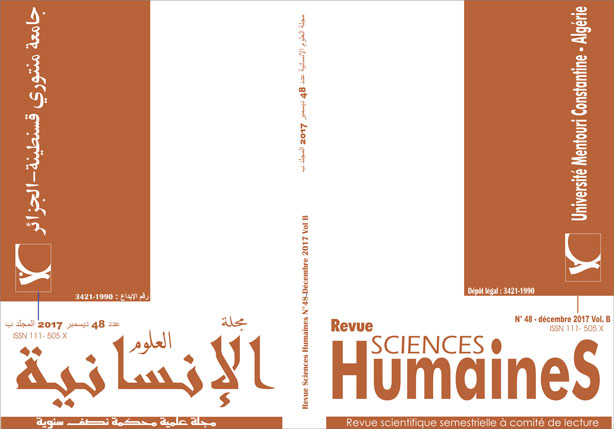The Correlation between Language Proficiency and the Use of Lexical Collocations by Algerian EFL Undergraduate Students in Essay Writings: a Case Study of Verb+ Noun Collocations
Keywords:
Correlation, Language Proficiency, Use, Lexical Collocations, Algerian EFL, Undergraduate, Student, Essay Writings, Verb, Noun, CollocationsAbstract
‘Pseudo-native speaker’ is the term given to a foreign language learner who has reached a high level of proficiency. Such level of proficiency is characterised by the mastery of grammar, vocabulary, and pronunciation. Consequently, a distinction must be drawn between grammatical proficiency and the idiomatic one. Idiomaticity has three basic levels of compositionality: free combinations, collocations, and idioms. The present research work investigates the mastery of Verb+Noun lexical collocations by Algerian EFL learners in Frères Mentouri university. It is hypothesised that Algerian EFL learnershave a low level of mastery in the usage and comprehension of Verb+Noun collocations.It is also hypothesised that the essays of Algerian EFL learners lack the use of appropriate Verb+Noun collocations. An online corpus (BNC) and two other online websites (Collocation Checker & O.O.C.D) were used as tools to measure learners’ collocational competence. Examined collocations were extracted from the learners’ examination essays. The analysis was done manually through identification and corpus usage. The findings of the study indicate that Algerian EFL learners have a low competence in dealing with Verb+Noun collocations. Thus, focus on collocational knowledge is required. Teachers must raise their students’ awareness on the importance of collocations in improving the oral and written quality of production. Learners have to, deliberately, be able to identify collocations, and memorise them within their contexts.
Downloads
References
Boussalia, S. (2010).Students’ difficulties in English-Arabic translation of collocations.
Unpublished master dissertation, université des Frères Mentouri, Algeria.
Darvishi, S. (2011). The investigation of collocational errors in university students’ writing
majoring in English. Paper presented at the 2011 International Conference on Education: Research and Innovation, Singapore. IACSIT. Retrieved from: www.ipedr.com
Farrokh, P. (2012). Raising awareness of collocations in ESL/EFL classrooms.Journal
Studies in Education, 2, 55-74. doi: 10.5296/jse.v2i3.1616
Gabrielatos, C. (1994). Collocations: Pedagogical implications, and their treatment in
pedagogical materials. Unpublished essay, Research Centre for English and Applied
Linguistics, 1-17. Retrieved from: www.academia.edu
Ganji, M. (2012). On the effect of gender and years of instruction of Iranian EFL learners’
collocational competence. English Language Teaching, (5), 123-133. doi:
5539/elt.v5n2p123
Henriksen, B. Research on L2 learners’ collocational competence and development –a
progress report. 29-56. Retrieved from: www.eurosla.org
Kuo, C. L. (2009). An analysis of the use of collocation by intermediate EFL college students
in Taiwan. ARECLS, (6), 141-155. Retrieved from: research.ncl.ac.uk
Li, C. C. (2005). A study of collocational errors types in ESL/EFL college learners’ writing.
Unpublished master dissertation, Ming Chuanuniversity, Taiwan.
Mansoor, M. S., Salman, Y. M. (2013). Collocation, colligation and semantic prosody.
BuhuthMustaqbalia, (43), 1-34. Retrieved from: emolex.u-grenoble3.fr
McKeown, K. R.,Radev, D. R. Collocations. 1-19. New York. Retrieved from: clair.si.umich.edu

















